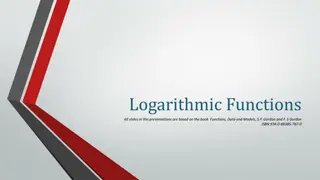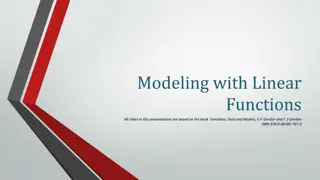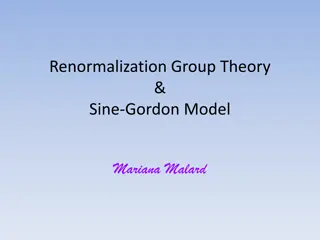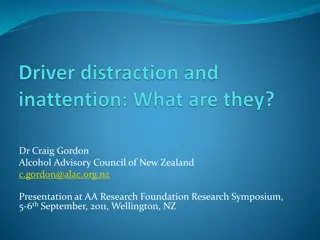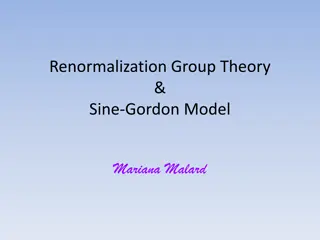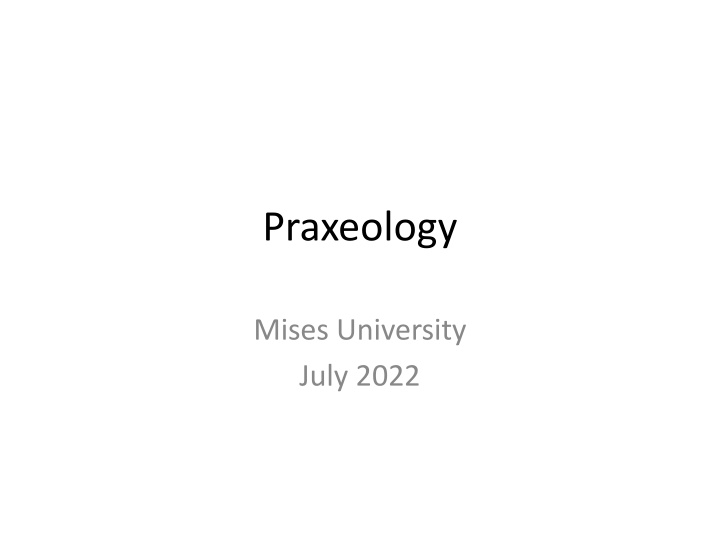
Understanding Praxeology and Human Action in Economics
Explore the fundamental concepts of praxeology and human action in economics as elucidated by Ludwig von Mises. Discover how purposeful behavior, rational and irrational actions, causality, a priori knowledge, and the role of other people shape economic decision-making. Delve into Mises' perspective on the nature of human action and the methodological approach in economics.
Download Presentation

Please find below an Image/Link to download the presentation.
The content on the website is provided AS IS for your information and personal use only. It may not be sold, licensed, or shared on other websites without obtaining consent from the author. If you encounter any issues during the download, it is possible that the publisher has removed the file from their server.
You are allowed to download the files provided on this website for personal or commercial use, subject to the condition that they are used lawfully. All files are the property of their respective owners.
The content on the website is provided AS IS for your information and personal use only. It may not be sold, licensed, or shared on other websites without obtaining consent from the author.
E N D
Presentation Transcript
Praxeology Mises University July 2022
The New Method Economics uses a different method from the natural sciences. The new method is not based on sense observation of external objects. It is based on direct acquaintance with action: I grasp through experience that I act. This is a key theme in the Human Action.
Purposeful Behavior Human action is purposeful behavior, the exercise of will on the world. Mises distinguishes between behavior in which you control your body and reflexes that aren t under your control. You can act from motives you aren t aware of. This counts as action.
Irrational Actions When you act, you have a goal and you think that using certain means will help you attain that goal. Your action counts as rational as long as you use the means because of this belief. You can be wrong about it, even hold beliefs that would be considered crazy by most people.
Do We Act? Some people think that all our behavior is determined by physical laws. Given the arrangement of material particles, fields, and forces in the universe at any time, what follows is determined. If we think our behavior is up to us, we are mistaken. Mises says we don t know this view is false, but it is just speculation. Action is an ultimate given.
Causality If we think something is a means to an end, we think it can bring about the end. In other words, we think it will cause the end. Causality and action go together. They are interdependent concepts. Mises s view of causality is like that of Hans Kelsen, Society and Nature, in some respects
Other People I understand my own actions, but how do I know that other people act? Mises s answer is pragmatic. We find it works if we take other people to be actors also.
A Priori Knowledge A priori knowledge is conceptual and deductive. Some people, e.g., the logical positivists, say that this consists only of analytic judgments. These are either definitions or parts of definitions or instances of logical truths. These are tautologies. The don t convey new information.
Misess Response Mises points out that the same claim could be made about math, but math gives us knowledge. He rejects conventionalism. We must think about the world using certain categories; we wouldn t be able to understand experience without them. He doesn t use the argument that if you deny that you act, your denial is self-refuting.
Rothbards Answer Rothbard says that we know people act because we see that they do. The senses present us with colors, shapes, sounds, etc. but this isn t all they convey. The mind abstracts from what the senses present. For example, it can judge that a color isn t a shape.
Rothbards Answer Continued Our minds also grasp that there are substances, that is things, that have essential properties. The mind sees directly that human beings act. In this view, our concepts are not grids imposed on reality. They present the object as it is.
Rothbard on the A Priori Rothbard is like the empiricists in that he takes all our knowledge to start with to be what is given to the senses. But he disagrees with the empiricists that everything we know about the world is contingent, that is, that it could be otherwise. If substances that have essential properties, they can t exist without these properties.
A Priori Continued If it s necessary that human beings act, we can say that this is an a priori truth. Since it s about the world, we can say it s a synthetic a priori truth. But a priori truth, for Rothbard, is not knowledge apart from the senses.
Ordinary Language Rothbard points out that praxeology is conducted in ordinary language. It wouldn t be an advantage to formalize praxeology using mathematical logic. We need to understand every step of the argument, rather than follow a mechanical procedure. By every step, I m referring to the derivation of theorems from the analysis of human action. Kant calls this ostensive proof.
Methodological Individualism Only individuals act. This doesn t mean collective entities like nations don t exist. Actions ascribed to them take place through actions by human beings. Collectives can only be understood through the meanings that individuals give them. They aren t perceivable through the senses.
Polylogism Because the Marxists and other opponents of the free market could not refute the arguments of the economists, they claimed that logic differs between classes. There is a bourgeois logic and a proletarian logic. This is a radical claim. It isn t just the claim that people have beliefs in accord with their own interests, but that the classes use different logics.
More Than One Logic The same type of claim was also made by racists. To Mises, this claim is senseless. There is only one logic. Mises doesn t have in mind various types of logical systems studied in mathematical logic. He means just ordinary common sense reasoning. This is what he says it is inconceivable for us to deny.




